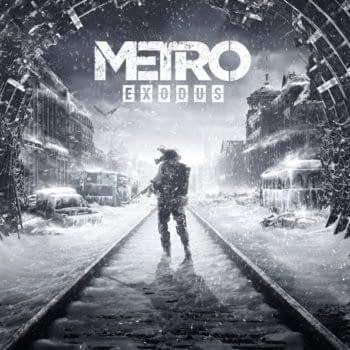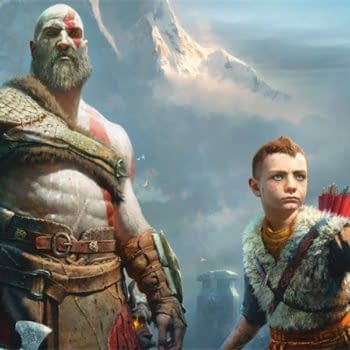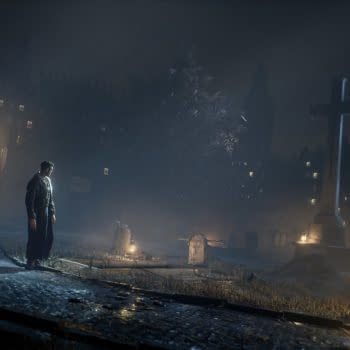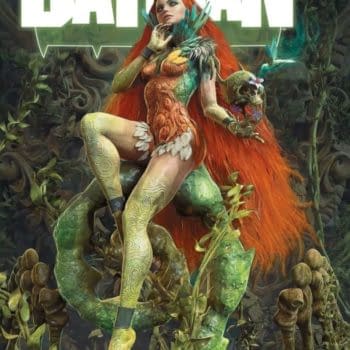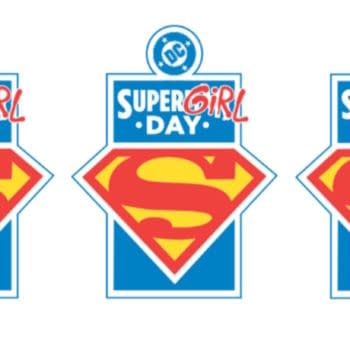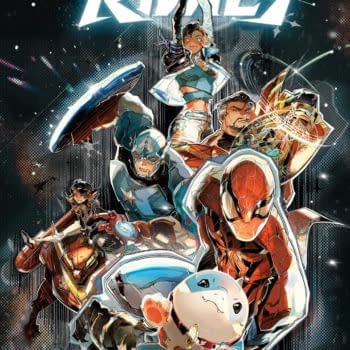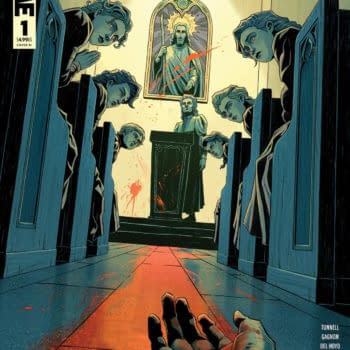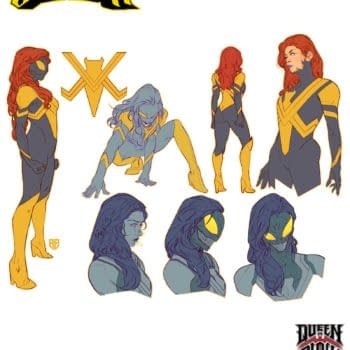Posted in: Comics, Recent Updates | Tagged: Comics, entertainment, from strip to script
From Strip To Script – The Grave Doug Freshley
Welcome to From Strip to Script, where I take a page of finished comic art and try to derive a script from it, to see what I can learn from the exercise.
So, this is actually the last one of these. The fifty-second column of a (mostly) weekly column means I've been doing these for roughly a year now, and that's as good a time as any to move on. Also, I believe I've mentioned in past columns that I've gone into culinary school, which is super, super rewarding, but is also requiring 12-hour days of commuting and classes, plus homework; I'm an old man now, pushing thirty, and need to conserve my energy.
Before I jump into the column proper, some thanks are in order:
Hannah Means-Shannon, who's since moved on from Bleeding Cool to Dark Horse, but served as my editor on the majority of this series. She recruited me, gave me carte blanche on how to approach this idea, and was much better at getting the columns up in a timely manner than I was about turning them in, especially towards the end of this run. Much thanks and the best of luck to her in her new role.
Patrick Dane, who took over for Hannah on these last few columns, and seems like a nice guy I'd have enjoyed working with for longer.
Matt Fraction, for mentioning doing something like this for himself in an Inkstuds interview, and giving me the idea to do so as an ongoing series.
All the readers that I've heard from (some of whom have been creators whose work I was looking at, which could've been mortifying). Everyone was startlingly polite and friendly, even with corrections, which…is not something I was expecting if I heard from anyone on the internet about a column where I (over)analyze comics?
All the readers in general, because look: this is not an un-self-indulgent weekly exercise, so I'm grateful for anyone who checked in and hopefully got something from it.
Speaking of this thing being self-indulgent: this final week, we're looking at one of the comics I wrote: my first graphic novel, The Grave Doug Freshley, with the masterful mpMann (art, lettering).
PAGE FIFTY-FOUR (SIX Panels)
P1. The SHERIFF spits.
SFX SPUT
P2. DOUG'S hand hovers over his gun…
P3. The spit falls through the air…
P4. DOUG'S hand juuuuust touches the butt of his gun…
P5. The spit hits the ground.
SFX PLOP
P6. DOUG is completely riddled with bullets from the SHERIFF and his posse.
SFX BANG! BANG! BANG! BAM! BANG!
Now, as a special bonus, let's see how I actually wrote the page, back in…2007, judging by the date on the file.
PAGE FOURTEEN*
Close up of the SHERIFF'S mouth as he spits.
DOUG goes for his gun.
The spit's in mid-air.
His hand juuuuuust touches the butt when…
The spit hits the dirt.
A hail of bullets rips through DOUG. I mean, he is just riddled.
*Doug was originally written as a five-issue miniseries, this being a page from issue 2.
So, What'd We Learn?
I know Doug was largely me trying to process my first exposure to Sergio Leone's flicks, so I was thinking a lot about drawn-out sequences, back-and-forth cuts, and close ups. How do you do that in comics? Okay, well, it looks like what I decided to was script cuts back and forth on mostly wordless close ups here…Leone would do that, that'd be a drawn out sequence…but in comics, that reads quickly. How then to draw it out? The back and forth cuts are on incremental motions; Leone would do that as well, a hand creeping along a gunbelt, a man rubbing his fingertips together, that sort of thing, but in real-time, because Leone's got the benefit of creating a larger, elongated moment in time. What we…what Marv…did with the spit is more akin to slow motion, "bullet time" to elongate the moment, but at the same time, Doug's incremental going for his gun is more "real time" and Leone. In this way, we translate the kind of…real-time slowness…of Leone.
And then we punctuate that slowness with the jittery, violent-not-violent cacophony of Doug taking All The Bullets. "Sergio Leone meets Looney Tunes" was our shorthand for Doug, whenever we had to talk it up.
I wrote my take on the page before looking at the old script, and I'm more than a little amused that a drawn out "juuuuuuuust" made it in, with almost a decade of writing between the two. I'm going to err on the side of that being an example of authorial style, not stagnation, anyway.
So, What'd I Learn, Overall?
I can't speak to all y'all's takeaways from these fifty-two bits (although I do hope you got something from them), but for myself?
I don't think I've really gained any great insight into what anyone else was thinking when they made their comics. I don't think I've read any minds with any of these, but I've exposed a lot of how I think about comics. Which is fine, but if I'd been more literary when we were coming up with titles for this, I might've suggested "Robin Wednesbury's Comics and Sequential Art".
I think adapting backwards from finished work made me just a little more "Dredd on bike" utilitarian in my scripting, because I'm describing what I see in front of me (and also just trying to get the thing done), not trying to translate what I see in my head. The exceptions are any time where there's a bit of gesture or business that I "get" but struggle to describe what it is about it that connects to me. Tackling those exceptions, however, is one of the joys of having done this; that's where I feel like I've worked my muscles.
I never really examined the fact that I always linked to the Comixology version of a comic I was talking about, except that's how I read 99% of my comics anymore. I read Island, Casanova, and Phonogram (shoutout here to Locust Moon Comics, where I get those), and the odd trades/GNs as books; anything else I follow regularly, or even just check out on a whim? Digital.
On crediting: I went with alphabetical order because you don't get a single page I've talked about without the contributions of all involved, even if I highlight specific creators before or after. If I had to change one thing in retrospect, I'd have also included Editors/Assistant Editors.
I'm not entirely sure whether doing this column clarified or calcified how I read pages. Meaning, did it enhance my ability to take what I enjoy about this medium and describe it, or did it just give me words to confirm/support my biases towards what I like about certain comics and the techniques therein? Maybe both? Probably both.
This was fun, all in all. Thanks again, everyone.
Josh Hechinger wrote for Bleeding Cool.





